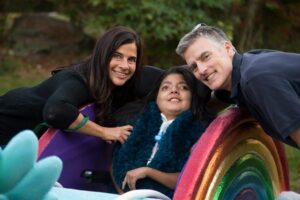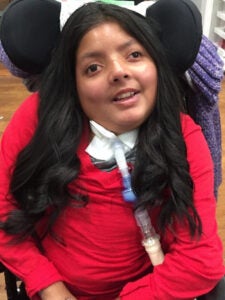Jessica Fein is the mom to Dalia, who has myoclonus epilepsy with ragged-red fibers (MERRF) syndrome, an extremely rare disease and type of mitochondrial disorder. The following article was shared by Jessica and contributed to the PTC Newsroom to help spread awareness about MERRF syndrome and to help others who are affected by rare diseases. Connect with Jessica for real talk about rare parenting on Instagram @feinjessica.
Do you have a rare disease story to share? Contact our news team at shareyourstory@ptcbio.com
Interested in our clinical trial for mitochondrial epilepsy? Learn more here.
When my daughter Dalia was 5, she was diagnosed with MERRF Syndrome, a rare form of mitochondrial disease. Neither my husband nor I had ever heard of mitochondrial disease. I’d barely heard of mitochondria. I had a vague recollection from high-school biology class and knew mitochondria were important, but I had no idea why.
The day of the diagnosis we learned way more than we could process. We learned that mitochondria are the powerhouse of the body’s cells. We learned that MERRF is extremely rare. And we learned that MERRF Syndrome is degenerative. The symptoms Dalia had – hearing loss, ataxia, and more – would surely get worse.

What we didn’t learn, what we couldn’t begin to imagine, is how profoundly Dalia’s diagnosis would impact her, our other two children, or ourselves.
Dalia’s disease progressed somewhat slowly until she was 9. Then, while on a family vacation in Florida, Dalia caught a cold that became pneumonia. We were flown back to Boston on a medical jet and went straight to Massachusetts General Hospital, where we remained in intensive care for three months. When Dalia was able to return home, she’d lost her ability to walk, talk, eat, and breathe without a ventilator.
Dalia is 16 now, and she can no longer move at all. She can’t even blink.
If the me of today were waiting outside that doctor’s office 11 years ago and could talk to the me back then who came away overwhelmed and confused, here’s what I’d say:
- When you’re ready, find other people who can relate. Your child’s disease is so rare you might not be able to meet people whose child has the same diagnosis, but other parents with medically complex children will “get it.” You’ll be surprised how many friends you will meet through social media who are on a similar journey.
 Be honest with your other kids in ways that their ages warrant. You might think that putting on a strong front is the best thing to do. It isn’t. It’s important for your other children to see that it’s okay to be scared or angry.
Be honest with your other kids in ways that their ages warrant. You might think that putting on a strong front is the best thing to do. It isn’t. It’s important for your other children to see that it’s okay to be scared or angry.
- This disease will not define your daughter and it won’t define you. It’s going to change your lives, for sure, but your daughter is still the same curious, feisty, fabulous person she was before the diagnosis. Find ways to keep celebrating all of her. Find ways to keep nourishing yourself, too.
- It’s okay to grieve. Your daughter’s life is going to look so different from what you imagined. Don’t feel guilty if you are sad about that. Ambiguous grief is a real thing, and it makes sense that you would experience a profound sense of loss.
- Most important, it’s okay to be happy. Even in the darkness, there’s always light to be found. Look for it. Your daughter and her siblings have one childhood. Try to welcome joy in whatever ways you can.
By Jessica Fein